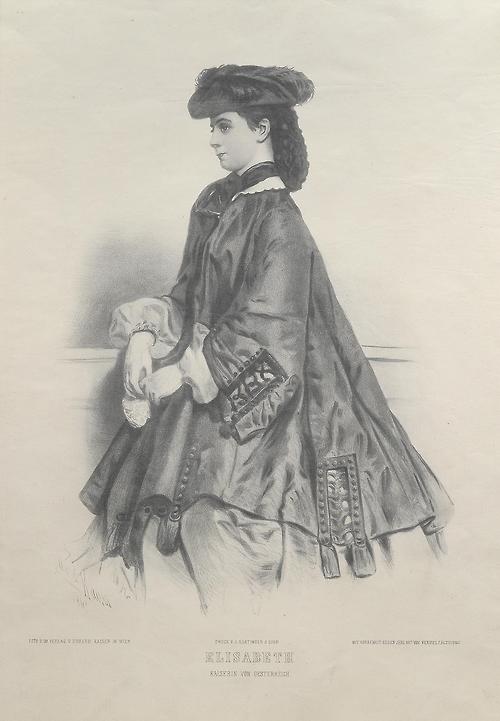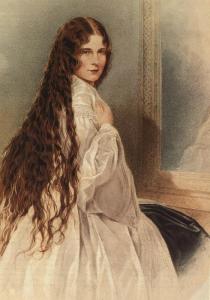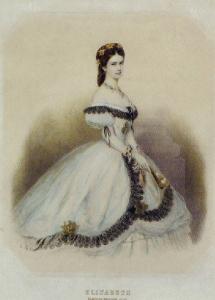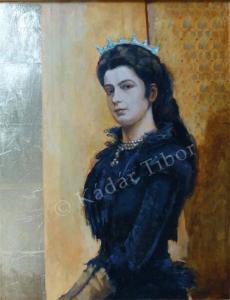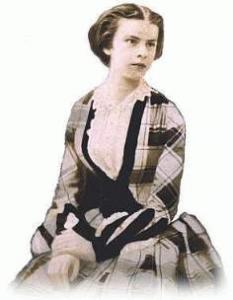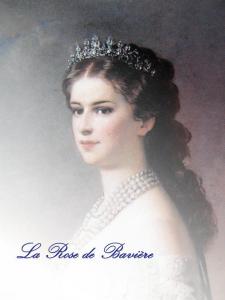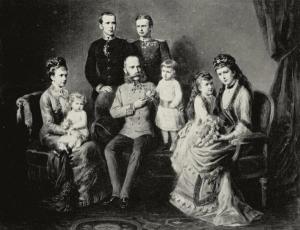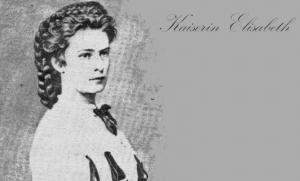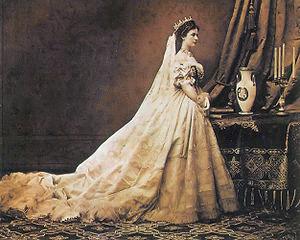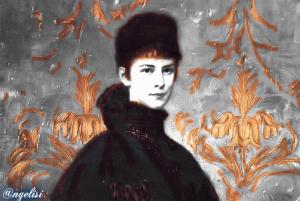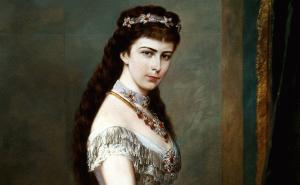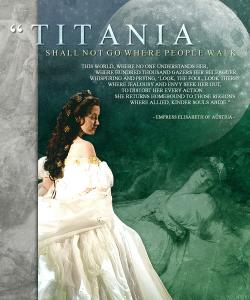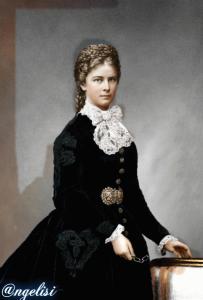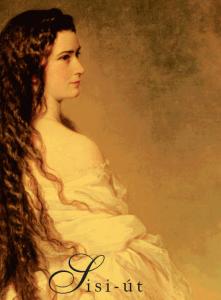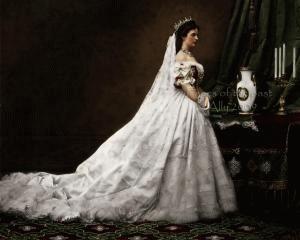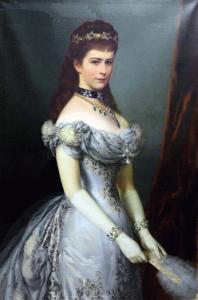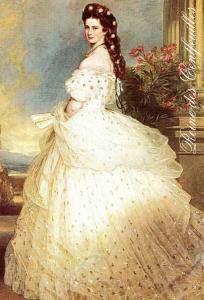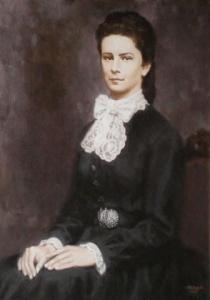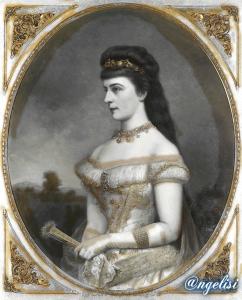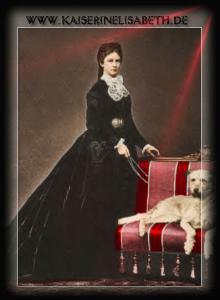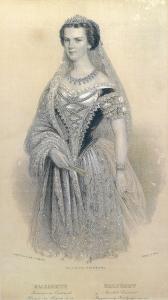
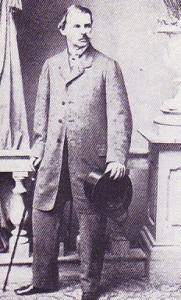 Maximilian Joseph, Duke in Bavaria
(Bamberg, December 4, 1808 - Monaco of Bavaria, November 15, 1888)
Scion of Wittelsbach-Zweibrücken-Birkenfeld-Gelnhausen, collateral branch of the Royal Family and Duke of Bavaria, the only son of Duke Pius Augustus and Princess Amalia Luisa Aremberg, Maximilian Joseph, nicknamed "the good Duke Max", is one of the most original figures of 'nineteenth-century Bavaria. Aristocratic Rebel, away from the court and the obligations of the label, William was educated by his grandfather because his father is suffering from a severe mental illness and physical deformities that prevent the exercise of free will. Attended a public high school like any other citizen of Monaco, then graduated in History and Science, in 1828 to suspend his studies in literature to marry, against his will, with the Princess Ludovica, daughter of King Maximilian I Joseph of Bavaria: a marriage imposed by grandfather (and King) to lift, even economically, the fortunes of the family and riavvicinarla the royal line of the dynasty. The two live a married life quite rowdy, but overall happy, even though it is said that the wedding night, frightened by the rough ways of the bridegroom, the young wife has locked in the closet of the bedroom! From that marriage were born five sons (Louis William, William Charles, Charles Theodore, Maximilian, Maximilian Emmanuel) and five female (Carlina Elena Teresa, Elizabeth Amalia Eugenia, Maria Amalia Sophia, and Sophie Charlotte Augusta Matilda Ludovica) of which eight will reach 'adulthood.
Very unselfish to the family, the father of some illegitimate love with whom to spend Christmas gathering them to legitimate offspring, Max is a great traveler, lover of exotic atmospheres: travels in Italy, Switzerland, Germany, Egypt, Greece and Turkey. In the courtyard of his neoclassical palace of Monaco, built by architect Von Klenze having inherited the large fortune of his grandfather, together with that of the very wealthy mother, had erected a small circus that loves to show off their children in a reckless and equestrian games café in which poets and painters gather under a big deadbeat fresco long 44 m inspired by ancient Roman bacchanalia decidedly risqué content. He likes to write poems and plays, which publishes in massive collections under the pseudonym "Phantasus", and playing the harp, an instrument for which he has a real fondness and for which, under the guidance of the great virtuoso Johann Petzmayer by he himself appointed 'virtuous room ", then picked up numerous ballads (1846) in a valuable anthology of traditional Bavarian folk melodies.
In 1839 he was appointed honorary member of the Bavarian Academy of Sciences and published an anthology of travel stories emphatically titled "Voyage en Orient" in which is provocatively insert blank pages with the word "censorship". Its library has 27,000 volumes. During a long trip to Egypt, from which returns with three children of color bought at the slave market and then baptized in a ceremony that shocked the whole outlandish Monaco, playing the harp climbing the pyramids at Giza and cross the desert by camel . As the daughter Elizabeth, Max is in constant motion, even when they're indoors: his niece Maria Valeria, a page of his diary dated June 21, 1884, is surprised to have seen him sitting talking! Beloved by the people for his liberal ideas and friendly manners, during the revolutionary uprisings of 1848 in his residence houses Maximilian's cousin / brother Louis I, King of Bavaria, who was forced to resign following the scandal caused by the relationship with the dancer Lola Montez.
Stricken with a severe form of arthritis, annoyed by the continuing problems caused by the behavior of the daughters, Elizabeth and Mary Sophia especially, retires in the beloved summer residence of Possenhofen preventing children to set foot. In 1886 his niece Maria Valeria writes of him: "After Mass in the chapel of the grandmother went to make a courtesy visit to his grandfather. Although in good health, forced to sit up, no longer able to walk, but otherwise do not find it changed. He talks like an old hunter, only very intelligent, although of trivial things. Since the family bores him infinitely, and prefers to read his books and his writings, he has held for five minutes and we did leave with a kiss. " He died on 11 November 1888 due to a stroke. His funeral was attended by all children, the son / nephew Emperor Francis Joseph and Rudolph but not his daughter Elizabeth.
From site : http://www.elisabeth-sissi.org/biografia.php?link=2
Maximilian Joseph, Duke in Bavaria
(Bamberg, December 4, 1808 - Monaco of Bavaria, November 15, 1888)
Scion of Wittelsbach-Zweibrücken-Birkenfeld-Gelnhausen, collateral branch of the Royal Family and Duke of Bavaria, the only son of Duke Pius Augustus and Princess Amalia Luisa Aremberg, Maximilian Joseph, nicknamed "the good Duke Max", is one of the most original figures of 'nineteenth-century Bavaria. Aristocratic Rebel, away from the court and the obligations of the label, William was educated by his grandfather because his father is suffering from a severe mental illness and physical deformities that prevent the exercise of free will. Attended a public high school like any other citizen of Monaco, then graduated in History and Science, in 1828 to suspend his studies in literature to marry, against his will, with the Princess Ludovica, daughter of King Maximilian I Joseph of Bavaria: a marriage imposed by grandfather (and King) to lift, even economically, the fortunes of the family and riavvicinarla the royal line of the dynasty. The two live a married life quite rowdy, but overall happy, even though it is said that the wedding night, frightened by the rough ways of the bridegroom, the young wife has locked in the closet of the bedroom! From that marriage were born five sons (Louis William, William Charles, Charles Theodore, Maximilian, Maximilian Emmanuel) and five female (Carlina Elena Teresa, Elizabeth Amalia Eugenia, Maria Amalia Sophia, and Sophie Charlotte Augusta Matilda Ludovica) of which eight will reach 'adulthood.
Very unselfish to the family, the father of some illegitimate love with whom to spend Christmas gathering them to legitimate offspring, Max is a great traveler, lover of exotic atmospheres: travels in Italy, Switzerland, Germany, Egypt, Greece and Turkey. In the courtyard of his neoclassical palace of Monaco, built by architect Von Klenze having inherited the large fortune of his grandfather, together with that of the very wealthy mother, had erected a small circus that loves to show off their children in a reckless and equestrian games café in which poets and painters gather under a big deadbeat fresco long 44 m inspired by ancient Roman bacchanalia decidedly risqué content. He likes to write poems and plays, which publishes in massive collections under the pseudonym "Phantasus", and playing the harp, an instrument for which he has a real fondness and for which, under the guidance of the great virtuoso Johann Petzmayer by he himself appointed 'virtuous room ", then picked up numerous ballads (1846) in a valuable anthology of traditional Bavarian folk melodies.
In 1839 he was appointed honorary member of the Bavarian Academy of Sciences and published an anthology of travel stories emphatically titled "Voyage en Orient" in which is provocatively insert blank pages with the word "censorship". Its library has 27,000 volumes. During a long trip to Egypt, from which returns with three children of color bought at the slave market and then baptized in a ceremony that shocked the whole outlandish Monaco, playing the harp climbing the pyramids at Giza and cross the desert by camel . As the daughter Elizabeth, Max is in constant motion, even when they're indoors: his niece Maria Valeria, a page of his diary dated June 21, 1884, is surprised to have seen him sitting talking! Beloved by the people for his liberal ideas and friendly manners, during the revolutionary uprisings of 1848 in his residence houses Maximilian's cousin / brother Louis I, King of Bavaria, who was forced to resign following the scandal caused by the relationship with the dancer Lola Montez.
Stricken with a severe form of arthritis, annoyed by the continuing problems caused by the behavior of the daughters, Elizabeth and Mary Sophia especially, retires in the beloved summer residence of Possenhofen preventing children to set foot. In 1886 his niece Maria Valeria writes of him: "After Mass in the chapel of the grandmother went to make a courtesy visit to his grandfather. Although in good health, forced to sit up, no longer able to walk, but otherwise do not find it changed. He talks like an old hunter, only very intelligent, although of trivial things. Since the family bores him infinitely, and prefers to read his books and his writings, he has held for five minutes and we did leave with a kiss. " He died on 11 November 1888 due to a stroke. His funeral was attended by all children, the son / nephew Emperor Francis Joseph and Rudolph but not his daughter Elizabeth.
From site : http://www.elisabeth-sissi.org/biografia.php?link=2
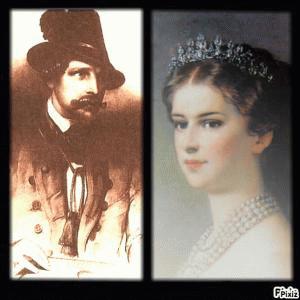 Max and Elizabeth
Also following the mythology created by the three films with Romy Schneider, was very beautiful on the fabled relationship that would bind Elizabeth to her father, but in reality we know rather little about. We know that Maximilian is completely disinterested in their children, leaving their education and marriage plans ambitious wife Ludovica and King Maximilian II of Bavaria who, as head of household, spetava the last word about it. Nothing makes us think that Max has had a special sympathy for the daughter Sissi since it did not try to carve out any particular role in any of the "negotiations" that led his daughter to the Austrian throne.
Legend has it that the embroidery detail on back green and white worn by Sissi at the ceremony for the bachelorette party and waives his right of succession to the throne has been designed by the Bavarian Duke Max in person and that a sentence is Arabic, seal of a sultan, auspicious happiness. That said, does not mean that Elizabeth has not loved the father, it is clear that the love of travel, the poetry of Heine and Wagner's music, as well as skill in the saddle, are paternal legacy.
The same Elizabeth, according to the accounts of her ladies in waiting, was fond of quoting his father as a teacher of good things in life: it is said that at the Hofburg, the Empress had done tending between two jambs of a door on a string to force it to skip all Sometimes it moved from one room to another: "Our father said we had to walk as light as butterflies and feet as they do not crawl the ladies." Unfortunately, at Sissi with her father has remained unknown, unlike the one with the mother, but we can imagine that Elizabeth liked to boast the raids father to shock the Viennese ladies, including mother-in-law.
Details are not known even to the daughter of Max tips to help you overcome the most difficult times, as happened at the secret birth of her daughter Maria Sofia, which will only comment, "Those are things that happen!", Or for daughter Sophie Charlotte intervening hard to mess up the ill-fated engagement to King Ludwig II of Bavaria. In later years the relationship between the two became very difficult, so that Max forced his daughter to no longer attend the Castle Possenhofen because he was disturbed by the ladies of the company and by the antics of his daughter who wanted to install gyms in every residence. It seems that the definitive break between the two dated back to a wedding anniversary celebration for the parents, a very simple celebration during which Max would read aloud a sonnet by Paolo Mantegazza taken from "The Century neurotic" harsh criticism against aristocrats who live at the expense of the people. Elizabeth would have felt criticized and abandoned vexed his father's residence. At the funeral of the father did not attend citing health problems are not well defined.
Flower of historians, biographers and psychologists are busy justifying the distrust of Elizabeth against the married life and drew a parallel with the unhappy life of the parents, but it would be unfair to blame all the good Max was not the simpleton who wants nobilotto often to believe, claiming that his dynastic rights were respected and that his rank was recognized (in 1845 by King Louis I demanded recognition of its right to the title "Royal Highness"): it was only a man full of zest for life, gentleman of his era, in which the few duties vested dynastic marriages of their daughters, especially after the wings making tarparono father of an empress and a queen.
From site : http://www.elisabeth-sissi.org/biografia.php?link=2
Max and Elizabeth
Also following the mythology created by the three films with Romy Schneider, was very beautiful on the fabled relationship that would bind Elizabeth to her father, but in reality we know rather little about. We know that Maximilian is completely disinterested in their children, leaving their education and marriage plans ambitious wife Ludovica and King Maximilian II of Bavaria who, as head of household, spetava the last word about it. Nothing makes us think that Max has had a special sympathy for the daughter Sissi since it did not try to carve out any particular role in any of the "negotiations" that led his daughter to the Austrian throne.
Legend has it that the embroidery detail on back green and white worn by Sissi at the ceremony for the bachelorette party and waives his right of succession to the throne has been designed by the Bavarian Duke Max in person and that a sentence is Arabic, seal of a sultan, auspicious happiness. That said, does not mean that Elizabeth has not loved the father, it is clear that the love of travel, the poetry of Heine and Wagner's music, as well as skill in the saddle, are paternal legacy.
The same Elizabeth, according to the accounts of her ladies in waiting, was fond of quoting his father as a teacher of good things in life: it is said that at the Hofburg, the Empress had done tending between two jambs of a door on a string to force it to skip all Sometimes it moved from one room to another: "Our father said we had to walk as light as butterflies and feet as they do not crawl the ladies." Unfortunately, at Sissi with her father has remained unknown, unlike the one with the mother, but we can imagine that Elizabeth liked to boast the raids father to shock the Viennese ladies, including mother-in-law.
Details are not known even to the daughter of Max tips to help you overcome the most difficult times, as happened at the secret birth of her daughter Maria Sofia, which will only comment, "Those are things that happen!", Or for daughter Sophie Charlotte intervening hard to mess up the ill-fated engagement to King Ludwig II of Bavaria. In later years the relationship between the two became very difficult, so that Max forced his daughter to no longer attend the Castle Possenhofen because he was disturbed by the ladies of the company and by the antics of his daughter who wanted to install gyms in every residence. It seems that the definitive break between the two dated back to a wedding anniversary celebration for the parents, a very simple celebration during which Max would read aloud a sonnet by Paolo Mantegazza taken from "The Century neurotic" harsh criticism against aristocrats who live at the expense of the people. Elizabeth would have felt criticized and abandoned vexed his father's residence. At the funeral of the father did not attend citing health problems are not well defined.
Flower of historians, biographers and psychologists are busy justifying the distrust of Elizabeth against the married life and drew a parallel with the unhappy life of the parents, but it would be unfair to blame all the good Max was not the simpleton who wants nobilotto often to believe, claiming that his dynastic rights were respected and that his rank was recognized (in 1845 by King Louis I demanded recognition of its right to the title "Royal Highness"): it was only a man full of zest for life, gentleman of his era, in which the few duties vested dynastic marriages of their daughters, especially after the wings making tarparono father of an empress and a queen.
From site : http://www.elisabeth-sissi.org/biografia.php?link=2
the parents of Sisi : Duke Max and Princess Ludovica
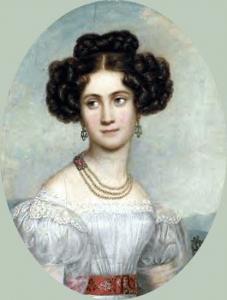 Ludovica Wilhelmine, Duchess "in" Bavaria
(Monaco and Munich, August 30, 1808 - Monaco of Bavaria, January 25, 1892)
Ludovica Wilhelmina, Princess Royal of Bavaria, is one of the so-called "Sisters Wittelsbach", daughter of Maximilian I Joseph, the first king of Bavaria, and his second wife, Caroline of Baden, beautiful girls that have their own charm conquered all of Europe. It is no coincidence, in fact, that each of them was destined for a brilliant marriage, and crowned Elizabeth is queen of Prussia, queen Maria Amalia of Saxony and Archduchess Sophie of Austria, mother of the future Emperor Francis Joseph. Ludovica is only prevented from becoming queen marrying, as she would like, the young Miguel de Braganza to rise to the throne Lusitanian. Fate, or rather her father, she did well for other programs in order to approximate the branch of the royal family with the duke, and to avoid a substantial loss of capital, the father had destined to the second cousin of Max Joseph , scion of the ducal branch of the family. In fact it was the destiny to decide, because Maximilian had already been promised to her older sister Josephine Massimiliana Carolina, but died before the engagement.
Their marriage was celebrated on September 9, 1828 Tagernsee, kissed by the love you can not say. Ludovica not prove any attraction or feelings for this young man with his head in the clouds revolutionary means, always busy with friends from all walks of life to speak of traveling to distant lands and especially uninterested dynastic affairs. It 's very likely that you feel less Ludovica sisters queens: it is the only one able to be relegated to getting married: Single from Princess Royal Duchess "in" Bavaria no role at court. After the first year of marriage, went to see her husband always busy traveling and have a good time with peasant girls and dancers, Ludovica she decided to take back what it is pouring out his ambitions on his daughters. When Elena, the eldest, was of marriageable age Ludovica of letters began to bombard her sister Sophia, which in turn is in search of a maiden of royal blood, but especially the Catholic, to be given in marriage to his son emperor. When everything is organized to bring together the two Bad Isch, in August of 1853, Ludovica then plays through and through. Can only belong to myths the idea that the Duchess has also brought with her second daughter Elizabeth by chance: blacks dell'astuta Ludovica plans had to be everything already predetermined.
The passion of Francis Joseph of character for women and girls wake up is too well known throughout Europe because Ludovica let convince Elena that girl more modest and quiet exuberant Elizabeth, can conquer the first time. Elizabeth is an interesting choice and the second, however, there is always the emperor's younger brother, Charles Louis, the young Elizabeth with whom he had befriended years ago during a visit to Innsbruck. Fate has it that the emperor falls in love with Elizabeth, completely neglecting the beautiful Helen. For Ludovica is a total victory: the fight is not just to convince the bewildered sister Sofia Sissi sra to the role that awaits. From that moment on the life of Ludovica, and one of his daughters, suddenly changed: the standard of living of the ducal family undergoes a radical change since all eyes are now focused on them, almost bourgeois small family who love to spend the summers in small castle Possenhofen and winters in Monaco concertini between private and circus performances. Once married Sissi, for Ludovica is almost child's play to "track" the other daughters. Elena, after suffering the humiliation of being rejected by the Emperor of Austria, finds solace by marrying the Prince of Thurn und Taxis, is not a crowned head, but still the scion of one of the oldest and wealthiest noble families of Germany. Mary becomes Queen Sofia of Bourbon Two Sicilies married Francis, heir to the throne of Naples. Matilda married the latter's brother, Count Luigi Trani. While Sophie Charlotte, after an ill-fated engagement to the King of Bavaria, Ludwig II, will marry the Duke of Alencon. Not bad for a simple Duchess "in" Bavaria.
Ludovica, beloved by his daughters and all family members, affectionately called "Louise", is considered the true architect of the social success of their daughters, and then the involuntary executioner of their happiness. Apart from Helen, who married a man she is in love, we can say that the other daughters are sacrificed in unhappy marriages destined to fail within a few years. Even his sons, albeit minor, must be subject to the obligations of being in-law became the most powerful man in Europe, although much more fortunate sisters. Only Louis, the eldest, must forfeit the title to the birthright to marry his beloved Henrietta Mendel, Baroness specially nominated actress Wallersee.
Women stubborn and resolute, Ludovica had to hold the reins of the family instead of selfless wife, administering a large heritage but squandered by a husband inattentive family economy. Despite what you may think, however, was not a proud lady and unabashedly ambitious, but otherwise a nice lady from the very simple ways. She loved her possums and kept them always in his lap scandalizing the ladies of the Empress when her daughter took away the fleas from their coats and then mash with your thumb nail on the tablecloth! He was generous mother for advice and assistance, always close to his daughters even in difficult times. Many trips to come to the aid of his daughter Elisabeth during moments of deep depression, as when in 1861 he went to Venice to stay with her. Despite being tortured by frequent and painful sore very often prevented her from even walking, never failed in their duties. He died at the age of 83 years, in 1892, following an attack of bronchitis. The newspapers reported that the coffin was accompanied to the burial in the chapel of Tegernsee, next to her husband by seventeen grandchildren and fifteen great-grandchildren.
from site: http://www.elisabeth-sissi.org/biografia.php?link=4
Ludovica Wilhelmine, Duchess "in" Bavaria
(Monaco and Munich, August 30, 1808 - Monaco of Bavaria, January 25, 1892)
Ludovica Wilhelmina, Princess Royal of Bavaria, is one of the so-called "Sisters Wittelsbach", daughter of Maximilian I Joseph, the first king of Bavaria, and his second wife, Caroline of Baden, beautiful girls that have their own charm conquered all of Europe. It is no coincidence, in fact, that each of them was destined for a brilliant marriage, and crowned Elizabeth is queen of Prussia, queen Maria Amalia of Saxony and Archduchess Sophie of Austria, mother of the future Emperor Francis Joseph. Ludovica is only prevented from becoming queen marrying, as she would like, the young Miguel de Braganza to rise to the throne Lusitanian. Fate, or rather her father, she did well for other programs in order to approximate the branch of the royal family with the duke, and to avoid a substantial loss of capital, the father had destined to the second cousin of Max Joseph , scion of the ducal branch of the family. In fact it was the destiny to decide, because Maximilian had already been promised to her older sister Josephine Massimiliana Carolina, but died before the engagement.
Their marriage was celebrated on September 9, 1828 Tagernsee, kissed by the love you can not say. Ludovica not prove any attraction or feelings for this young man with his head in the clouds revolutionary means, always busy with friends from all walks of life to speak of traveling to distant lands and especially uninterested dynastic affairs. It 's very likely that you feel less Ludovica sisters queens: it is the only one able to be relegated to getting married: Single from Princess Royal Duchess "in" Bavaria no role at court. After the first year of marriage, went to see her husband always busy traveling and have a good time with peasant girls and dancers, Ludovica she decided to take back what it is pouring out his ambitions on his daughters. When Elena, the eldest, was of marriageable age Ludovica of letters began to bombard her sister Sophia, which in turn is in search of a maiden of royal blood, but especially the Catholic, to be given in marriage to his son emperor. When everything is organized to bring together the two Bad Isch, in August of 1853, Ludovica then plays through and through. Can only belong to myths the idea that the Duchess has also brought with her second daughter Elizabeth by chance: blacks dell'astuta Ludovica plans had to be everything already predetermined.
The passion of Francis Joseph of character for women and girls wake up is too well known throughout Europe because Ludovica let convince Elena that girl more modest and quiet exuberant Elizabeth, can conquer the first time. Elizabeth is an interesting choice and the second, however, there is always the emperor's younger brother, Charles Louis, the young Elizabeth with whom he had befriended years ago during a visit to Innsbruck. Fate has it that the emperor falls in love with Elizabeth, completely neglecting the beautiful Helen. For Ludovica is a total victory: the fight is not just to convince the bewildered sister Sofia Sissi sra to the role that awaits. From that moment on the life of Ludovica, and one of his daughters, suddenly changed: the standard of living of the ducal family undergoes a radical change since all eyes are now focused on them, almost bourgeois small family who love to spend the summers in small castle Possenhofen and winters in Monaco concertini between private and circus performances. Once married Sissi, for Ludovica is almost child's play to "track" the other daughters. Elena, after suffering the humiliation of being rejected by the Emperor of Austria, finds solace by marrying the Prince of Thurn und Taxis, is not a crowned head, but still the scion of one of the oldest and wealthiest noble families of Germany. Mary becomes Queen Sofia of Bourbon Two Sicilies married Francis, heir to the throne of Naples. Matilda married the latter's brother, Count Luigi Trani. While Sophie Charlotte, after an ill-fated engagement to the King of Bavaria, Ludwig II, will marry the Duke of Alencon. Not bad for a simple Duchess "in" Bavaria.
Ludovica, beloved by his daughters and all family members, affectionately called "Louise", is considered the true architect of the social success of their daughters, and then the involuntary executioner of their happiness. Apart from Helen, who married a man she is in love, we can say that the other daughters are sacrificed in unhappy marriages destined to fail within a few years. Even his sons, albeit minor, must be subject to the obligations of being in-law became the most powerful man in Europe, although much more fortunate sisters. Only Louis, the eldest, must forfeit the title to the birthright to marry his beloved Henrietta Mendel, Baroness specially nominated actress Wallersee.
Women stubborn and resolute, Ludovica had to hold the reins of the family instead of selfless wife, administering a large heritage but squandered by a husband inattentive family economy. Despite what you may think, however, was not a proud lady and unabashedly ambitious, but otherwise a nice lady from the very simple ways. She loved her possums and kept them always in his lap scandalizing the ladies of the Empress when her daughter took away the fleas from their coats and then mash with your thumb nail on the tablecloth! He was generous mother for advice and assistance, always close to his daughters even in difficult times. Many trips to come to the aid of his daughter Elisabeth during moments of deep depression, as when in 1861 he went to Venice to stay with her. Despite being tortured by frequent and painful sore very often prevented her from even walking, never failed in their duties. He died at the age of 83 years, in 1892, following an attack of bronchitis. The newspapers reported that the coffin was accompanied to the burial in the chapel of Tegernsee, next to her husband by seventeen grandchildren and fifteen great-grandchildren.
from site: http://www.elisabeth-sissi.org/biografia.php?link=4

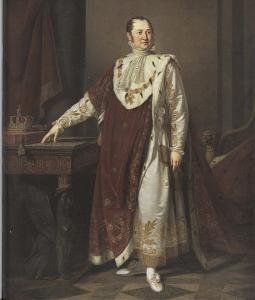
The maternal grandfather of Sisi : Maximilian I Joseph of Bavaria
Maximilian I (also known as Maximilian Joseph) (27 May 1756 – 13 October 1825) was duke of Zweibrücken from 1795 to 1799, prince-elector of Bavaria (as Maximilian IV Joseph) from 1799 to 1805, king of Bavaria (as Maximilian I) from 1806 to 1825. He was a member of the House of Palatinate-Zweibrücken-Birkenfeld, a branch of the House of Wittelsbach.
Early life
Maximilian, the son of the count palatine Frederick Michael of Zweibrücken-Birkenfeld and Maria Francisca of Sulzbach, was born at Schwetzingen – between Heidelberg and Mannheim.
He was carefully educated under the supervision of his uncle, Duke Christian IV of Zweibrücken, became Count of Rappoltstein in 1776 and took service in 1777 as a colonel in the French army and rose rapidly to the rank of major-general. From 1782 to 1789 he was stationed at Strasbourg, but at the outbreak of the French Revolution he exchanged the French for the Austrian service, taking part in the opening campaigns of the revolutionary wars.
Duke of Zweibrücken and Elector of Bavaria and the Palatinate
On 1 April 1795 he succeeded his brother, Charles II, as duke of Zweibrücken, however, his duchy was entirely occupied by the French. On 16 February 1799 Maximilian Joseph became Elector of Bavaria and Count Palatine of the Rhine, the Arch-Steward of the Empire, and Duke of Berg on the extinction of the Palatinate-Sulzbach line with the death of the elector Charles Theodore.
The sympathy with France and with French ideas of enlightenment which characterized his reign was at once manifested. In the newly organized ministry Count Max Josef von Montgelas, who, after falling into disfavour with Charles Theodore, had acted for a time as Maximilian Joseph's private secretary, was the most potent influence, an influence wholly "enlightened" and French. Agriculture and commerce were fostered, the laws were ameliorated, a new criminal code drawn up, taxes and imposts equalized without regard to traditional privileges, while a number of religious houses were suppressed and their revenues used for educational and other useful purposes. He closed the University of Ingolstadt in May 1800 and moved it to Landshut.
In foreign politics Maximilian Joseph's attitude was from the German point of view less commendable. With the growing sentiment of German nationality he had from first to last no sympathy, and his attitude throughout was dictated by wholly dynastic, or at least Bavarian, considerations. Until 1813 he was the most faithful of Napoleon's German allies, the relation being cemented by the marriage of his eldest daughter to Eugène de Beauharnais. His reward came with the Treaty of Pressburg (26 December 1805), by the terms of which he was to receive the royal title and important territorial acquisitions in Swabia and Franconia to round off his kingdom. He assumed the title of king on 1 January 1806. On 15 March he ceded the Duchy of Berg to Napoleon's brother-in law Joachim Murat.
King of Bavaria
The new king of Bavaria was the most important of the princes belonging to the Confederation of the Rhine, and remained Napoleon's ally until the eve of the Battle of Leipzig, when by the Treaty of Ried (8 October 1813) he made the guarantee of the integrity of his kingdom the price of his joining the Allies.
By the first Treaty of Paris (3 June 1814), however, he ceded Tyrol to Austria in exchange for the former Grand Duchy of Würzburg. At the Congress of Vienna, which he attended in person, Maximilian had to make further concessions to Austria, ceding Salzburg and the quarters of the Inn and Hausruck in return for the western part of the old Palatinate. The king fought hard to maintain the contiguity of the Bavarian territories as guaranteed at Ried but the most he could obtain was an assurance from Metternich in the matter of the Baden succession, in which he was also doomed to be disappointed.
At Vienna and afterwards Maximilian sturdily opposed any reconstitution of Germany which should endanger the independence of Bavaria, and it was his insistence on the principle of full sovereignty being left to the German reigning princes that largely contributed to the loose and weak organization of the new German Confederation. The Federal Act of the Vienna Congress was proclaimed in Bavaria, not as a law but as an international treaty. It was partly to secure popular support in his resistance to any interference of the federal diet in the internal affairs of Bavaria, partly to give unity to his somewhat heterogeneous territories, that Maximilian on 26 May 1818 granted a liberal constitution to his people. Montgelas, who had opposed this concession, had fallen in the previous year, and Maximilian had also reversed his ecclesiastical policy, signing on 24 October 1817 a concordat with Rome by which the powers of the clergy, largely curtailed under Montgelas's administration, were restored. The new parliament proved to be more independent than he had anticipated and in 1819 Maximilian resorted to appealing to the powers against his own creation; but his Bavarian "particularism" and his genuine popular sympathies prevented him from allowing the Carlsbad Decrees to be strictly enforced within his dominions. The suspects arrested by order of the Mainz Commission he was accustomed to examine himself, with the result that in many cases the whole proceedings were quashed, and in not a few the accused dismissed with a present of money.
Maximilian died at Nymphenburg Palace, near Munich, on 13 October 1825 and was succeeded by his son Ludwig I. Maximilian is buried in the crypt of the Theatinerkirche in Munich.
Cultural legacy
Under the reign of Maximilian Joseph the Bavarian Secularization (1802–1803) led to the nationalisation of cultural assets of the Church. The Protestants were emancipated. In 1808 he founded the Academy of Fine Arts Munich.
The city of Munich was extended by the first systematic expansion with the new Brienner Strasse as core. In 1810 Max Joseph ordered construction of the National Theatre Munich in French neo-classic style. The monument Max-Joseph Denkmal before the National Theatre was created in the middle of the square Max-Joseph-Platz as a memorial for King Maximilian Joseph by Christian Daniel Rauch and carried out by Johann Baptist Stiglmaier. It was only revealed in 1835 since the king had rejected to be eternalized in sitting position.
In 1801 he led the rescue operation when a glassmaker's workshop collapsed, saving the life of Joseph von Fraunhofer, a 14 year-old orphan apprentice. Max Joseph donated books and directed the glassmaker to give Fraunhofer time to study. Fraunhofer went on to become one of the most famous optical scientists and artisans in history, inventing the spectroscope and spectroscopy, making Bavaria noted for fine optics, and joining the nobility before his death at age 39.
He was elected a Royal Fellow of the Royal Society in 1802.
Private life and family
In private life Maximilian was kindly and simple. He loved to play the part of Landesvater, walking about the streets of his capital en bourgeois and entering into conversation with all ranks of his subjects, by whom he was regarded with great affection.
Maximilian married twice and had a total of thirteen children.
His first wife was Auguste Wilhelmine Marie of Hesse-Darmstadt, daughter of Prince Georg Wilhelm of Hesse-Darmstadt — (14 April 1765–30 March 1796). They were married on 30 September 1785 in Darmstadt. There were five children of this marriege.
Ludwig I of Bavaria (1786–1868), married Therese of Saxe-Hildburghausen.
Augusta Amalia Ludovika Georgia, Princess of Bavaria and Duchess of Leuchtenberg (21 June 1788–13 May 1851), married Eugène de Beauharnais.
Amalie Marie Auguste, Countess Palatine of the Rhine and of Zweibrücken (October 1790 –24 January 1794).
Charlotte Auguste, Princess of Bavaria and Empress of Austria (8 February 1792–9 February 1873), married William I of Württemberg, and then Francis I of Austria.
Karl Theodor Maximilian August, Prince of Bavaria (7 July 1795–16 August 1875).
Maximilian's second wife was Karoline Friederike Wilhelmine of Baden, daughter of Margrave Karl Ludwig of Baden — (13 July 1776–13 November 1841).They were married on 9 March 1797 in Karlsruhe. There were eight children of this marriage. S
tiilborn son (5 September 1799).
Karl Friedrich Ludwig Wilhelm Maximilian Joseph, Prince of Bavaria (28 October 1800–12 February 1803).
Elisabeth Ludovika, Princess of Bavaria and Queen of Prussia ("Elise") (13 November 1801–14 December 1873), married Frederick William IV of Prussia.
Amalie Auguste, Princess of Bavaria and Queen of Saxony (13 November 1801–8 November 1877), married John I of Saxony.
Sophie, Princess of Bavaria and Archduchess of Austria (1805–1872), mother of Franz Joseph I of Austria and Maximilian I of Mexico.
Marie Anne Leopoldine Elisabeth Wilhelmine, Princess of Bavaria (27 January 1805–13 September 1877), married Frederick Augustus II of Saxony.
Marie Ludovika Wilhelmine Princess of Bavaria (1808–1892), married Duke Maximilian Joseph in Bavaria.
Maximiliana Josepha Caroline, Princess of Bavaria (21 July 1810–4 February 1821).
MATERNAL GRANPARENTS OF SISI
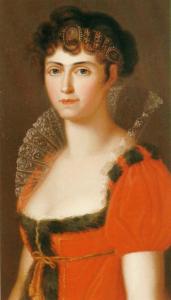
The maternal grandmother of Sisi : Caroline of Baden
Caroline of Baden (Karoline Friederike Wilhelmine; 13 July 1776 – 1841) (German: Friederike Karoline Wilhelmine) of Baden was an Electress of Bavaria and later the first Queen of Bavaria as the spouse of King Maximilian I Joseph.
Biography
She was the eldest child of Charles Louis, Hereditary Prince of Baden, and his wife Amalie of Hesse-Darmstadt. She was born 13 July 1776, twin sister of Katharina Amalie Christiane Luise.
Caroline was considered as a bride for the Louis Antoine Henri de Bourbon, Duke of Enghien, but the fear of attracting opposition from France made her family hesitate.
On 9 March 1797, in Karlsruhe, she became the second spouse of Maximilian, Duke of Palatinate-Zweibrücken, who two years later would inherit the Electorate of Bavaria. As a result of the dissolution of the Holy Roman Empire in 1806, the rank of Elector became obsolete, and the ruler of Bavaria was promoted to the rank of King. As a result, Caroline became Queen of Bavaria.
She was allowed to keep her Protestant religion and had her own Protestant pastor, which was unique for a Bavarian queen. She was described as a very dignified consort and hostess of the Bavarian court, and raised her daughters to have a strong sense of duty.
Caroline of Baden died 13 November 1841, outliving her husband by sixteen years and one month. Due to her Protestant religion, her funeral was conducted with so little royal dignity that there were public protests. By order of the Catholic archbishop of Munich, Lothar Anselm von Gebsattel, all participating Catholic clergy were dressed in ordinary clothes instead of church vestments. The Protestant clergy were halted at the church door and not allowed to proceed inside for the service, so Ludwig Friedrich Schmidt gave the funeral sermon there. Afterwards, the funeral procession dissipated, and the coffin was placed in the burial crypt without ceremony. This treatment of his beloved stepmother permanently softened the attitude of Caroline's stepson Ludwig I of Bavaria, who up until that time had been a strong opponent of Protestantism in spite of his marriage to the Protestant princess Therese of Saxe-Hildburghausen.
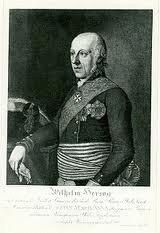 paternal grandfather Sisi: Duke Pius August in Bavaria
Duke Pius August in Bavaria,[1] full German name: Pius August Herzog in Bayern[1] (born 1 August 1786 in Landshut, Electorate of Bavaria;[1] died 3 August 1837 in Bayreuth, Kingdom of Bavaria[1]) was a Duke in Bavaria as a member of the Palatinate-Birkenfeld-Gelnhausen line of the House of Wittelsbach. Pius August was a grandfather of Empress Elisabeth of Austria through his son Duke Maximilian Joseph in Bavaria. Early life Born in Landshut, Pius August was the third child of Duke Wilhelm in Bavaria and his wife Countess Palatine Maria Anna of Zweibrücken-Birkenfeld. Marriage and issue Pius August married Princess Amélie Louise of Arenberg, daughter of Duke Louis Marie of Arenberg and his wife Marie Adélaïde Julie de Mailly, dame d'Ivry-sur-Seine, on 26 May 1807 in Brussels.[1] Pius August and Amélie Louise had one son:[1] ■Duke Maximilian Joseph in Bavaria (4 December 1808 – 15 November 1888)[1]
Later life In 1815, Pius August became an honorary member of the Bavarian Academy of Sciences and Humanities. He loved to travel. Titles and styles ■1 August 1786 – 16 February 1799: Count Palatine Pius August of Birkenfeld-Gelnhausen
■16 February 1799 – 3 August 1837: His Royal Highness Duke Pius August in Bavaria
From site : http://en.wikipedia.org/wiki/Duke_Pius_August_in_Bavaria
paternal grandfather Sisi: Duke Pius August in Bavaria
Duke Pius August in Bavaria,[1] full German name: Pius August Herzog in Bayern[1] (born 1 August 1786 in Landshut, Electorate of Bavaria;[1] died 3 August 1837 in Bayreuth, Kingdom of Bavaria[1]) was a Duke in Bavaria as a member of the Palatinate-Birkenfeld-Gelnhausen line of the House of Wittelsbach. Pius August was a grandfather of Empress Elisabeth of Austria through his son Duke Maximilian Joseph in Bavaria. Early life Born in Landshut, Pius August was the third child of Duke Wilhelm in Bavaria and his wife Countess Palatine Maria Anna of Zweibrücken-Birkenfeld. Marriage and issue Pius August married Princess Amélie Louise of Arenberg, daughter of Duke Louis Marie of Arenberg and his wife Marie Adélaïde Julie de Mailly, dame d'Ivry-sur-Seine, on 26 May 1807 in Brussels.[1] Pius August and Amélie Louise had one son:[1] ■Duke Maximilian Joseph in Bavaria (4 December 1808 – 15 November 1888)[1]
Later life In 1815, Pius August became an honorary member of the Bavarian Academy of Sciences and Humanities. He loved to travel. Titles and styles ■1 August 1786 – 16 February 1799: Count Palatine Pius August of Birkenfeld-Gelnhausen
■16 February 1799 – 3 August 1837: His Royal Highness Duke Pius August in Bavaria
From site : http://en.wikipedia.org/wiki/Duke_Pius_August_in_Bavaria
The Patern Grandparents of Sisi
 The grandmother of Sisi : Princess Amelie Louise of Arenberg
Princess and Duchess Amélie Louise of Arenberg,[1] full German name: Amalie Luise, Prinzessin und Herzogin von Arenberg[1] and full French name: Amélie Louise, princesse et duchesse d'Arenberg, (born 10 April 1789 in Brussels, Austrian Netherlands;[1] died 4 April 1823 in Bamberg, Kingdom of Bavaria[1]) was a member of the House of Arenberg by birth and, through her marriage to Duke Pius August in Bavaria, a member of the Palatinate-Birkenfeld-Gelnhausen line of the House of Wittelsbach. Amélie Louise was a grandmother of Empress Elisabeth of Austria through her son Duke Maximilian Joseph in Bavaria. Early life Born in Brussels, Austrian Netherlands, Amélie Louise was the daughter of Prince Louis Marie d'Arenberg and his first wife, Marie Adélaïde Julie de Mailly, dame d'Ivry-sur-Seine. Marriage and issue Amélie Louise married Duke Pius August in Bavaria, son of Duke Wilhelm in Bavaria and his wife Countess Palatine Maria Anna of Zweibrücken-Birkenfeld, on 26 May 1807 in Brussels.[1] Pius August and Amélie Louise had one son:[1] ■Duke Maximilian Joseph in Bavaria (4 December 1808 – 15 November 1888)[1]
After their marriage, the couple moved to Bamberg and received their son Maximilian Joseph the following year. In 1817, Amélie Louise sent her only son to reside with his great uncle Maximilian I Joseph of Bavaria, where he studied at the Royal Institute of Education. Amélie Louise did not see him until 1820. Shortly after returning from her second visit to Munich, Amélie Louise died in 1823 in Bamberg. She was interred in the burial crypt of Tegernsee Abbey. Titles and styles ■10 April 1789 – 26 May 1807: Her Serene Highness Princess and Duchess Amélie Louise of Arenberg
■26 May 1807 – 4 April 1823: Her Royal Highness Duchess Amélie Louise in Bavaria
from site : http://en.wikipedia.org/wiki/Princess_Am%C3%A9lie_Louise_of_Arenberg
The grandmother of Sisi : Princess Amelie Louise of Arenberg
Princess and Duchess Amélie Louise of Arenberg,[1] full German name: Amalie Luise, Prinzessin und Herzogin von Arenberg[1] and full French name: Amélie Louise, princesse et duchesse d'Arenberg, (born 10 April 1789 in Brussels, Austrian Netherlands;[1] died 4 April 1823 in Bamberg, Kingdom of Bavaria[1]) was a member of the House of Arenberg by birth and, through her marriage to Duke Pius August in Bavaria, a member of the Palatinate-Birkenfeld-Gelnhausen line of the House of Wittelsbach. Amélie Louise was a grandmother of Empress Elisabeth of Austria through her son Duke Maximilian Joseph in Bavaria. Early life Born in Brussels, Austrian Netherlands, Amélie Louise was the daughter of Prince Louis Marie d'Arenberg and his first wife, Marie Adélaïde Julie de Mailly, dame d'Ivry-sur-Seine. Marriage and issue Amélie Louise married Duke Pius August in Bavaria, son of Duke Wilhelm in Bavaria and his wife Countess Palatine Maria Anna of Zweibrücken-Birkenfeld, on 26 May 1807 in Brussels.[1] Pius August and Amélie Louise had one son:[1] ■Duke Maximilian Joseph in Bavaria (4 December 1808 – 15 November 1888)[1]
After their marriage, the couple moved to Bamberg and received their son Maximilian Joseph the following year. In 1817, Amélie Louise sent her only son to reside with his great uncle Maximilian I Joseph of Bavaria, where he studied at the Royal Institute of Education. Amélie Louise did not see him until 1820. Shortly after returning from her second visit to Munich, Amélie Louise died in 1823 in Bamberg. She was interred in the burial crypt of Tegernsee Abbey. Titles and styles ■10 April 1789 – 26 May 1807: Her Serene Highness Princess and Duchess Amélie Louise of Arenberg
■26 May 1807 – 4 April 1823: Her Royal Highness Duchess Amélie Louise in Bavaria
from site : http://en.wikipedia.org/wiki/Princess_Am%C3%A9lie_Louise_of_Arenberg




